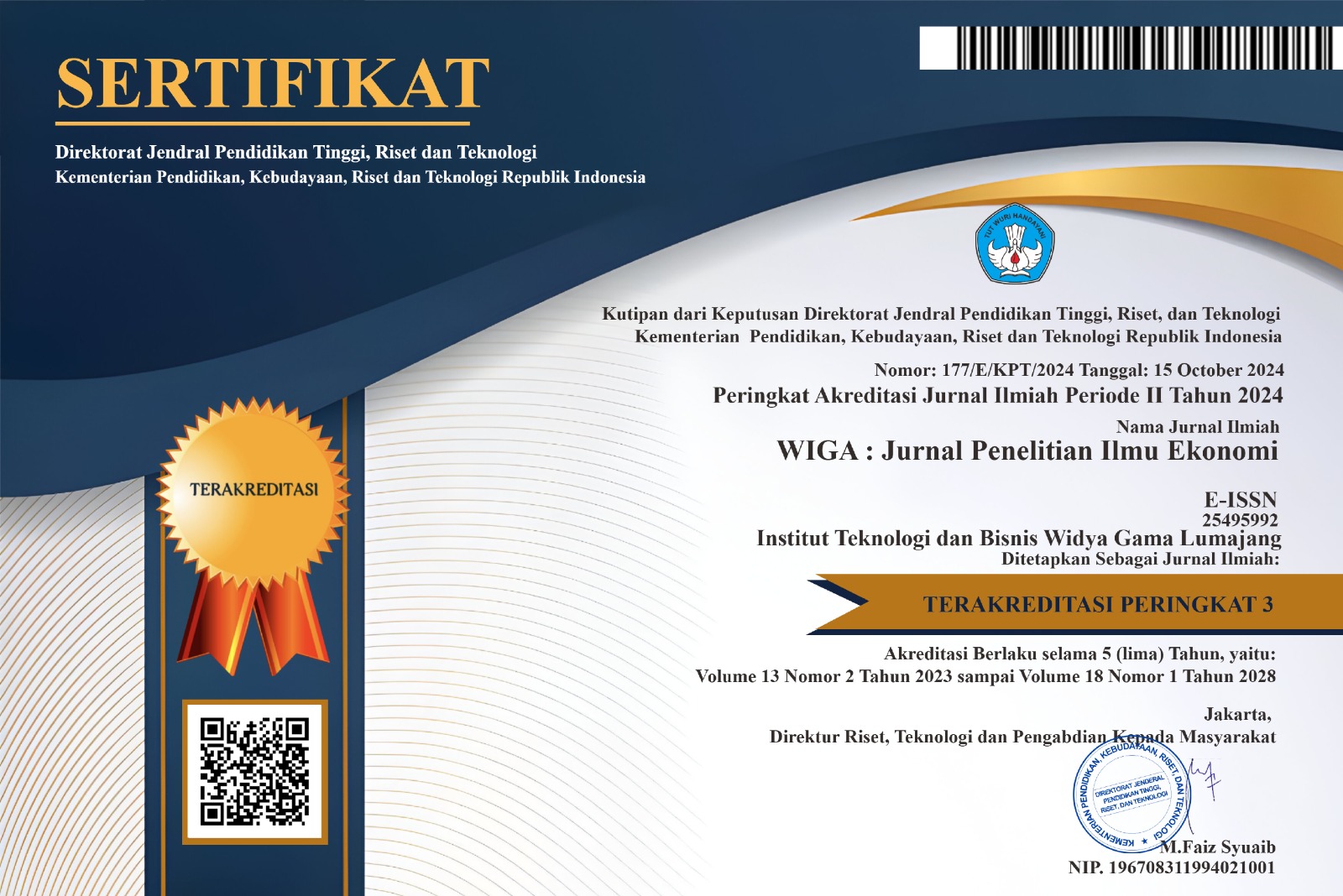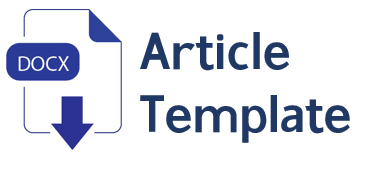Strategy Economic Development Creative Based on BUMDes Change Management: Inclusive Creative Economy Change Management of Panggok Market
DOI:
https://doi.org/10.30741/wiga.v15i1.1423Keywords:
Based View Change, Human Relations, Leadership, Organization Public, Resistance ChangeAbstract
One thing public organizations cannot escape is organizational transformation. Nevertheless, there is sometimes opposition to the changes that take place rather than positive reception. To improve the economic welfare of the Cilacap community, the Village Owned Enterprise (BUMDES) Slarang Village, Cilacap and other public organizations must plan organizational changes based on community interests. This includes communication with the youth organization of Slarang Village residents and a vision, mission, strategy, and goals. With the participation of citizens and cooperation in human relations, creative economic programs do not cause negative resistance impacts on the environment. This research was conducted using qualitative research analysis tests. Qualitative research is a descriptive research method and uses analysis to explain a phenomenon. Data collected in qualitative research are in the form of written and spoken words, such as ethnography, document studies, natural observations, and phenomenology and are supported by through literature studies of journal publications and books. Research results show that change management is aimed at for give business solutions which required in success in an organized and methodical manner, through managing the impact of change on those involved. As in Panggok Market, it is a culinary tourism that is built focusing on change management of economic development based on creativity has been built with creativity both from its place, its food or the people who sell it. Panggok Market was established with the aim of improving the welfare of the surrounding community in accordance with the vision and mission of Panggok Market and preserving traditional Central Javanese food. Panggok market has inspired other culinary villages that follow the railroad tracks, which have proven to be effective in improving the economy of residents.
Downloads
References
Bishop, W. J. (2001). Leadership Challenges in a Changing Industry. Journal Awwa, 93(4), 128–132. https://doi.org/10.1002/j.1551-8833.2001.tb09178.x
Chamim. (2020). Food Data of Panggok Market. (A. Sukmawati, Interviewer).
Coffman, K., & Lutes, K. (2007). Change Management: Getting User Buy-In. New York: Management of Change.
Daft, R. L. (1998). Organization Theory and Design. California: South Western College Publishing.
Dewi, R. R., & Kurniawan, T. (2019). Manajemen Perubahan Organisasi Publik: Mengatasi Resistensi Perubahan. Natapraja, 7(1), 53–72. https://doi.org/10.21831/jnp.v7i1.24599
Dina, P., & Hakim, H. (2024). Strategi Pengembangan Ekonomi Kreatif Berdasarkan Change Management Bumdes: Change Management Ekonomi Kreatif Inklusif Pasar Panggok. Cilacap: Universitas Nahdlatul Ulama Al Ghazali Cilacap.
Djulius, H., Xiao, L., Juanim, J., Priatna, D. K., & Munawaroh, S. (2021). Market Structure, Conduct, and Performance of the Creative Industry in Indonesia. The Journal of Asian Finance, Economics and Business, 8(12), 337–343. Retrieved from https://koreascience.kr/article/JAKO202133452446042.page
Geriya, I. W. (2000). Transformasi Kebudayaan Bali Memasuki Abad XXI. Denpasar: Dinas Kebudayaan Bali.
Gunaryo. (2008). Development Economy Creative 2025. Jakarta: Team Indonesia Design Power-Department of Trade.
Hutabarat, L. B. R. F. W. M. (2015). Strategi Pengembangan Usaha Kuliner di Kota Malang Berbasis Ekonomi Kreatif. Jurnal Ekonomi Dan Studi Pembangunan (Journal of Economics and Development Studies), 7(1), 12–19. Retrieved from https://journal.um.ac.id/index.php/jesp/article/view/5312
KEA European Affairs. (2006). The Economy of Culture in Europe. Berlin: KEA European Affairs.
Kemendag RI. (2008). Studi dan Pengembangan Ekonomi Kreatif Indonesia. Jakarta: Kemendag RI.
Kotter, J. P. (2011). Leading Change. Boston: Harvard Business Press.
Lientz, B., & Rea, K. (2004). Breakthrough IT Change Management. New York: Routledge.
Luthfy, R. M. (2018). Jagoan dan Kekuasaan. Yogyakarta: Basabasi.
Polnaya, G. A., & Darwanto, D. (2015). Pengembangan Ekonomi Lokal Untuk Meningkatkan Daya Saing Pada Ukm Ekonomi Kreatif Batik Bakaran Di Pati, Jawa Tengah. Jurnal Bisnis Dan Ekonomi, 22(1), 1–10. Retrieved from https://www.unisbank.ac.id/ojs/index.php/fe3/article/view/4118
Presiden RI. (2015). Peraturan Presiden Nomor 2 Tahun 2015 Tentang Rencana Pembangunan Jangka Menengah Nasional Tahun 2015-2019. Jakarta: Pemerintah RI.
Rahmawati, F. (2021). Development of Creative Industry Through Utilization of Local Cassava Food. Economic Education And Entrepreneurship Journal, 4(2), 159–164. Retrieved from http://repository.lppm.unila.ac.id/41925/1/24299-59819-1-PB.pdf
Rangkuti, F. (2011). SWOT Balance Scorrecard. Jakarta: PT Gramedia Pustaka Utama.
Robbins, S. P., Judge, T. A., & Campbell, T. T. (2017). Organizational Behaviour. New York: Pearson Education.
Suryana. (2013). Ekonomi Kreatif, Ekonomi Baru: Mengubah Ide dan Menciptakan Peluang. Jakarta: Salemba Empat.
UNDP, & UNCTAD. (2008). Creative Economy Report 2008: The Challenge Of Assessing The Creative Economy: Towards Informed Policy-Making. Ganeva: United Nations.
Wiko, I. K. (2010). Industry Creative. Jakarta: Baduose Media.
Young, S. D., & O’Byrne, S. F. (2001). EVA and Value-Based Management: A Practical Guide to Implementation. New York: McGraw-Hill Education.
Yuwono, C. D. I., & Putra, M. (2005). Faktor Emosi dalam Proses Perubahan Organisasi. Jurnal Psikologi, 7(3), 250–263. Retrieved from https://journal.unair.ac.id/INSAN@faktor-emosi-dalam-proses-perubahan-organisasi-article-1168-media-8-category-10.html
Downloads
Published
How to Cite
Issue
Section
License
Copyright (c) 2025 Dina Prasetyaningrum, Hakim

This work is licensed under a Creative Commons Attribution-NonCommercial 4.0 International License.










